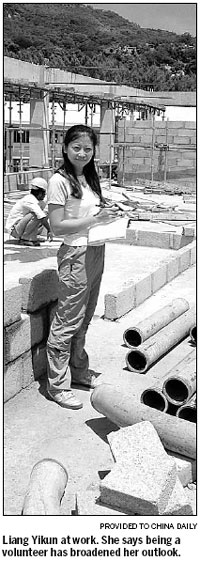Island nation a staging post for aid
Updated: 2013-11-10 07:56
By Li Wenfang(China Daily)
|
|||||||
Liang Yikun says she feels lucky she was the only engineer among 18 volunteers from Guangzhou to work in the Seychelles last year. She found the one-year experience rewarding.
Assigned to project budgeting for the country's Ministry of Land Use and Housing, Liang says she budgeted 22 projects on her own and took part in four major projects, including the largest primary school in the 115-island country.
She also wrote invitations and notices for tender, analysis reports on those tenders and progress payment approvals in her voluntary work, which ended in September.
The 33-year-old says that at the start her boss at the ministry felt she did not appear to be fully up to the task.
"I was asked whether I knew the British Commonwealth system (in project budgeting) when I met him for the first time. I was lucky that I had learned about the system at my Hong Kong-invested company. He found my English was fine."
The boss decided Liang would start with small projects.
Liang says she applied for a whole set of the series Standard Method of Measurement of Buildings 7th Edition and memorized the general requirements in projects in the first three days. Minor changes to the code are applied in the Seychelles.

With little professional training, Liang started to work on her fourth day at the ministry.
She displayed her ability in discussions of other projects and was later allowed to work on projects on her own and assigned jobs outside project budgeting.
Among the projects she was involved in, Liang says she found work with hillside shanties the most remarkable.
Houses were set up on poles and wrapped in iron sheeting, and many of them toppled in floods at the end of last year, she says.
The ministry was called upon to renovate or rebuild several hundred such houses a day. Liang says she had to work overtime to cope with the work, which involved bumpy rides in a four-wheel-drive to do fieldwork.
She worked with many volunteers and expatriates from other countries at the ministry, she says.
There are too few subjects on offer at the local university, and the country lacks talent in project budgeting, she says. Some locals study construction-related subjects overseas but don't return to the Seychelles, she says.
Liang says that while the main island of Mahe, on which she lived, is blessed with eye-catching scenery, living there posed many daily challenges.
Since most of the food items in the Seychelles are imported, prices are a lot higher than in Guangzhou, she says. Vegetables and fruits were often two to three times the cost of those in Guangzhou, and at one stage tomatoes were selling for 40 yuan ($6.6) a kilogram.
The water supply is rudimentary, Liang says, and seven of the Guangzhou volunteers had to share one tap in their living quarters.
Over the year, Liang says, the job broadened her outlook.
"I used to be restless and complain a lot. I realized that some people are less well-off than I am, but they soldier on."
As a deputy team leader, Liang also helped arrange outings and parties for the Guangzhou volunteers and a visit to a nursing home.
Liang's team included a Chinese teacher, a music teacher, a piano teacher and 14 medical workers.
Fu Yajing took 70 percent of the bus routes on Mahe to teach Chinese at 13 primary and middle schools.
The doctors had nearly 80,000 patient visits over the year, which is just 6,000 fewer than the population of the Seychelles. They performed 1,250 surgical operations, says Xiong Guanhua, the team leader.
Lu Bin, a community doctor, was stationed alone on another two islands for three months.
Since 2007, 88 volunteers have been sent from Guangdong province to Africa, according to Guangdong Youth Volunteer Action Guiding Center.
liwenfang@chinadaily.com.cn
(China Daily 11/10/2013 page4)